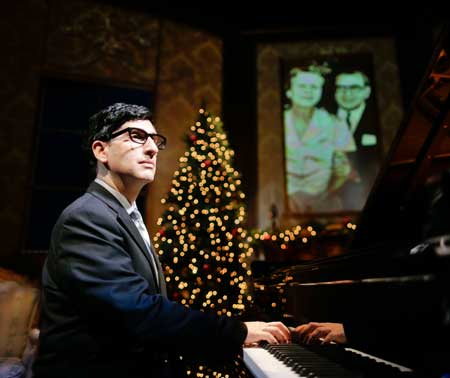A New Musical Play
Lyrics and Music by Irving Berlin
Book by Hershey Felder
Scenic Design: Hershey Felder and Trevor Hay; Lighting Design: Richard Norwood; Projection Design: Andrew Wilder, Sound Design: Erik Carstensen
ArtsEmerson
Cutler Majestic Theater
Boston
July 9 – August 2, 2015
With Hershey Felder (Irving Berlin)

Photo: 88 Entertainment
Courtesy of ArtsEmerson
Irving Berlin, composer of innumerable songs many of which are familiar and famous, lived to be over 100, filling much of the twentieth century with his wonderful and voluminous catalog. His life was charmed, but also touched by tragedy, and this beautifully acted and sung account presents a lovely condensation of Berlin’s work and outlook in the context of his personal narrative.
The presumption of the piece is a kind of look back by the very aged Berlin who cohabits the stage with his younger self who serves as the primary narrator. In passing, as well, the spirits of Berlin’s two beloved wives and a number of other characters, including Berlin’s nebbishy manager who dissuaded him from publishing some of his greatest hits early on because he felt they were too sentimental, populate the stage imaginatively.
Felder, who has given a series of productions – most notably as George Gershwin, but also as Leonard Bernstein, Chopin and Beethoven, and has, as well, mounted a musical rendition about the Civil War, Abe Lincoln’s Piano, and about a young woman pianist who survived the Nazis via the kindertransport, The Pianist of Willesden Lane, really hits his stride here. The other productions, by and large excellent, sometimes had a moment or two when singing was not quite right or the energy of the depiction flagged. Here, the depiction and Felder’s musical interpretations are, from soup to nuts, pitch perfect. Over the past year or two, it seems Felder has worked on his voice and has clearly made it a much more consistent instrument.

Photo: 88 Entertainment
Courtesy of ArtsEmerson
Beginning with the complaint by the older Berlin that audiences did not really get what White Christmas was all about, nor understood the background and intent of many of his songs, the young Berlin begins a long account of his life and the musical moments that punctuated it. Each of the songs is characterized and framed by its autobiographical context, enriched with a story or two, and sung to perfection. The result is beautiful, moving and cohesive.
The story of Berlin’s marriages are both heartbreaking and poignant. His first wife, who Berlin married when he was very young, died of typhoid fever as a young woman, leaving Berlin bereft and without motivation to create. Having conquered the musical world early in his 20s – the show notes that Berlin was already the country’s most famous songwriter by the time he was twenty-three – he was challenged enough by grief and despondency to cause an interruption in his prolific output. A second love affair and marriage – to a wealthy socialite who abandoned her unbelievably significant inheritance to marry Berlin – enabled him to reinvent himself and to continue to produce many of the classics for which he is best known.
This sense of loss and rediscovery is all told through Berlin’s songs, and Felder does a great job of interpreting them, crafting them dramatically and, especially at the very end, editing, selecting and compiling as a kind of patchwork medley to evoke a sense of the myriad of Berlin songs that were absurdly famous but which could not quite fit in the considerable roster of highlighted elements that sketch the composer’s story here.
Felder is not only a great conveyor of the main character in question, but he is, as well, a hilarious renderer of the cast of unseen supporting actors and actresses in the various tales he tells. Wafting from Berlin Jewish New York persona to his patrician second wife’s aristocratic demeanor, or to an old man with a heavy Yiddish accent, contributes to an entertainingly diverse set of performances, funny and vivid at the same time.
Mutimedia projections are used subtly but brilliantly, displaying various shots of Berlin and his wives, or of supporting scenes that frame the narrative. The nuanced complexity of those visual displays adds to the satisfaction, ramified, as is the production itself, to give a sense of deep texture while maintaining clear focus.
– BADMan
Leave a Reply